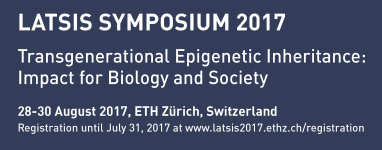Conferences

The Latsis Symposium 2017 is motivated by the wish and strong need to discuss and debate about the novel field of transgenerational epigenetic inheritance, an emerging discipline that is currently revolutionizing biology and is bringing novel perspectives for medical research and the society. The field addresses a key question in biology: What mediates heredity. While it was thought to have been resolved by genetics, this question has re-emerged in the post-genomic era because of the recognition that there is more to an organism than its gene sequences. The question is considered one of the most burning and urgent to answer to date. The main aim of the Latsis 2017 symposium is to discuss the breadth of biological phenomena involving epigenetics and their importance for transgenerational inheritance. The conference focuses on the issue of cross- and trans-generational inheritance of traits acquired by environmental exposure and personal experiences, a major mode of transmission that works outside classical Mendelian inheritance. Epigenetics is one of the most active and vibrant disciplines in biomedical research. It is of key importance because it not only provides new fundamental knowledge about basic mechanisms of biology but it also addresses critical medical issues. The identification of epigenetic marks and processes such as DNA methylation, histone posttranslational modifications and non-coding RNAs are moving the understanding of biological functions forward. Large-scale mapping projects have started to provide increasingly rich descriptions of the epigenome but have still incompletely answered questions about the role of these biochemical marks. Meanwhile there is growing interest in the therapeutic potential of epigenetic drugs that can modulate the epigenetic landscape and possibly have therapeutic actions that other drugs do not have. Genes encoding proteins that read, write or erase epigenetic marks are often mutated in neurological, psychiatric and metabolic diseases and in cancer, and are therefore key targets for potential innovative treatments. The conference will combine presentations from leaders in the field of epigenetics and epigenetic inheritance related to behavior, metabolism and physiology in humans and animal models, from mental health and epidemiology to bioinformatics and ethics. It will address the question of how epigenetic processes mediate the impact of experiences across one or multiple generations. Germline and non-germline modes of transmission and challenges for DNA methylation, chromatin modifications and ncRNAs as mechanisms of epigenetic inheritance will be discussed. The inherent difficulties of this challenging discipline and the innovative approaches that can address these difficulties will be critically discussed. The program includes lectures, short presentations and poster sessions. It also includes a public lecture (in German) discussing how epigenetics can change our view on health. This public lecture is open to everyone (academics, journalists and any citizen).
https://www.latsis2017.ethz.ch/

